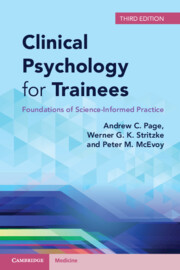Book contents
- Clinical Psychology for Trainees
- Clinical Psychology for Trainees
- Copyright page
- Contents
- Chapter 1 A Science-Informed Model of Clinical Psychology Practice
- Chapter 2 Relating with Clients
- Chapter 3 Assessing Clients
- Chapter 4 Matching Treatments and Monitoring Client Progress
- Chapter 5 Linking Assessment to Treatment: Case Formulation
- Chapter 6 Treating Clients
- Chapter 7 Brief Interventions
- Chapter 8 Low-Intensity Psychological Interventions
- Chapter 9 Group Treatment
- Chapter 10 Programme Evaluation
- Chapter 11 Case Management
- Chapter 12 Supervision
- Chapter 13 Managing Ruptures in Therapeutic Alliance
- Chapter 14 Respecting the Humanity of Clients: Cross-Cultural and Ethical Aspects of Practice
- Chapter 15 Providing Therapy at a Distance and Working in Rural and Remote Settings
- Chapter 16 Psychologists as Health Care Providers
- Chapter 17 Working in Private Practice – Dr Clair Lawson; Clinical Psychologist and Director; Lawson Clinical Psychology
- References
- Index
Chapter 2 - Relating with Clients
Published online by Cambridge University Press: 14 April 2022
- Clinical Psychology for Trainees
- Clinical Psychology for Trainees
- Copyright page
- Contents
- Chapter 1 A Science-Informed Model of Clinical Psychology Practice
- Chapter 2 Relating with Clients
- Chapter 3 Assessing Clients
- Chapter 4 Matching Treatments and Monitoring Client Progress
- Chapter 5 Linking Assessment to Treatment: Case Formulation
- Chapter 6 Treating Clients
- Chapter 7 Brief Interventions
- Chapter 8 Low-Intensity Psychological Interventions
- Chapter 9 Group Treatment
- Chapter 10 Programme Evaluation
- Chapter 11 Case Management
- Chapter 12 Supervision
- Chapter 13 Managing Ruptures in Therapeutic Alliance
- Chapter 14 Respecting the Humanity of Clients: Cross-Cultural and Ethical Aspects of Practice
- Chapter 15 Providing Therapy at a Distance and Working in Rural and Remote Settings
- Chapter 16 Psychologists as Health Care Providers
- Chapter 17 Working in Private Practice – Dr Clair Lawson; Clinical Psychologist and Director; Lawson Clinical Psychology
- References
- Index
Summary
Clinical psychological practice is founded upon the therapeutic relationship. A science-informed practice then requires that the elements used to build that relationship have an evidence base. Thus, the chapter reviews the empirical foundations of the therapeutic relationship and what steps can be taken to build a therapeutic alliance that correlates positively with beneficial treatment outcomes. The chapter outlines in practical steps how strong therapeutic relationships can be built by evidence-based practices that strengthen the alliance in an empathic manner. It illustrates key skills of building empathy through encouraging, re-stating, and paraphrasing communications in a manner that conveys to the patient an understanding of the content and the emotion behind what is communicated. The chapter concludes with a discussion of problems that can arise in the therapeutic relationship and practical steps to manage alliance ruptures.
Keywords
Information
- Type
- Chapter
- Information
- Clinical Psychology for TraineesFoundations of Science-Informed Practice, pp. 12 - 25Publisher: Cambridge University PressPrint publication year: 2022
